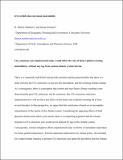Irreversible Does Not Mean Unavoidable
Author(s)
Matthews, H. D.; Solomon, Susan
DownloadSolomon_Irreversible does.pdf (281.3Kb)
OPEN_ACCESS_POLICY
Open Access Policy
Creative Commons Attribution-Noncommercial-Share Alike
Terms of use
Metadata
Show full item recordAbstract
Understanding how decreases in CO[subscript 2] emissions would affect global temperatures has been hampered in recent years by confusion regarding issues of committed warming and irreversibility. The notion that there will be additional future warming or “warming in the pipeline” if the atmospheric concentrations of carbon dioxide were to remain fixed at current levels (1) has been misinterpreted to mean that the rate of increase in Earth's global temperature is inevitable, regardless of how much or how quickly emissions decrease (2–4). Further misunderstanding may stem from recent studies showing that the warming that has already occurred as a result of past anthropogenic carbon dioxide increases is irreversible on a time scale of at least 1000 years (5, 6). But irreversibility of past changes does not mean that further warming is unavoidable.
Date issued
2013-03Department
Massachusetts Institute of Technology. Department of Earth, Atmospheric, and Planetary SciencesJournal
Science
Publisher
American Association for the Advancement of Science (AAAS)
Citation
Matthews, H. D., and S. Solomon. “Irreversible Does Not Mean Unavoidable.” Science 340, no. 6131 (April 26, 2013): 438–439.
Version: Original manuscript
ISSN
0036-8075
1095-9203